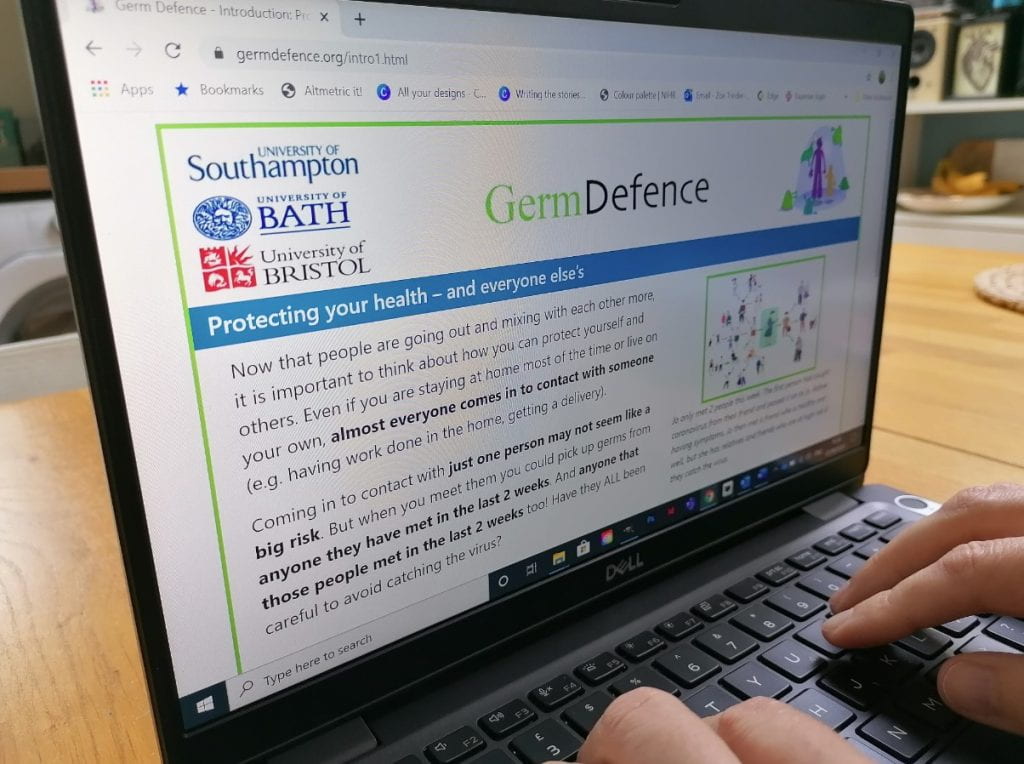12 December 2023
A newly published randomised controlled trial (RCT) used an innovative trial design to rapidly roll out a behavioural intervention aimed at reducing infections during the COVID-19 pandemic. Though the trial’s results, published in Implementation Science, found the Germ Defence website did not appear to reduce infections during the pandemic, they do show how trusted research environments (TREs) can be used to evaluate new treatments safely and quickly.

This was the first RCT where follow up was conducted entirely within a TRE. The study’s novel design meant GP practices and patients did not have to return any data, as all analysis was conducted via the OpenSAFELY TRE. OpenSAFELY TRE gives researchers access to 40% of the English population’s anonymous health records.
Germ Defence is a behaviour change website that gives practical advice on how to reduce the spread of infection in the home. It was found to be effective in reducing the spread of seasonal and swine flu in a previous RCT.
During the trial, half of all GP practices in England were randomly selected to send out the Germ Defence website link to their patients in the autumn of 2020 (the intervention arm). The remaining practices were asked to do the same in spring 2021.
Researchers then looked at rates of respiratory infection, including coronavirus and seasonal flu, in both groups of practices. They also looked at other outcomes including how often people visited their GP and used antibiotics.
The study team gave every GP practice a unique link to the website that they could send on to their patients. Using these unique links meant the team could see whether the patients were accessing the intervention without the practices needing to report back.
Website statistics showed that around 460 practices shared their link with patients, who then went on to use the site over 300,000 times (with an average user satisfaction score of 7.52 out of 10). This was 16% of the practices invited, but the research team had hoped that at least 25% would participate. Participation below this level means no firm conclusions could be made about the effectiveness of the intervention.
While no evidence of a difference in infection rates was observed between the two groups, the findings are nevertheless important. The trial design allowed the team to safely recruit GP practices during the pandemic. They used several new techniques to reduce the burden on practices and improve the number who could take part in research. These included:
- Recruiting practices via email, removing the lengthy process of contacting individual practices (although to avoid overwhelming practices this method should only be used when rapid enrolment is necessary)
- Using unique GP practice weblinks, which allowed researchers to understand how each practice used the intervention without needing to contact the practice
- Using national routinely collected patient record data accessed through OpenSAFELY, to analyse anonymised GP records securely – demonstrating that randomised trial follow-up can be done in a TRE
Professor Jeremy Horwood, one of the lead authors of the study, said:
“The NHS was under immense strain during the pandemic, including GP practices, so conducting a large trial to roll out Germ Defence rapidly was challenging. GP practices didn’t have much spare time for research. So we tried to design a trial that required minimal work from practices, so more could take part. We hope this novel efficient trial design will be valuable for rolling out other interventions rapidly and safely.”
Ben Ainsworth, Associate Professor of Psychology, University of Southampton and the other lead author, said:
“It’s important that new treatments and interventions can be evaluated rapidly. In this project the scientific experts worked with a range of healthcare and research professionals, patients and members of the public to ensure that we could do this without compromising data security and patient safety.”
Further information
About the NIHR
The National Institute for Health Research (NIHR) is the nation’s largest funder of health and care research. The NIHR:
- funds, supports and delivers high quality research that benefits the NHS, public health and social care
- engages and involves patients, carers and the public in order to improve the reach, quality and impact of research
- attracts, trains and supports the best researchers to tackle the complex health and care challenges of the future
- invests in world-class infrastructure and a skilled delivery workforce to translate discoveries into improved treatments and services
- partners with other public funders, charities and industry to maximise the value of research to patients and the economy.
The NIHR was established in 2006 to improve the health and wealth of the nation through research, and is funded by the Department of Health and Social Care. In addition to its national role, the NIHR supports applied health research for the direct and primary benefit of people in low- and middle-income countries, using UK aid from the UK government.